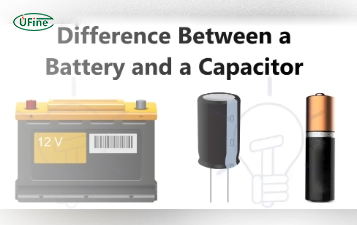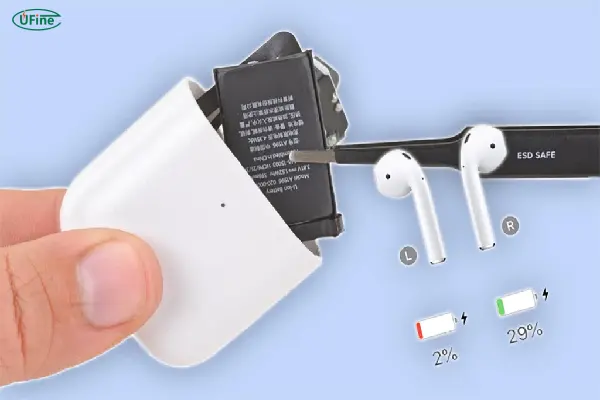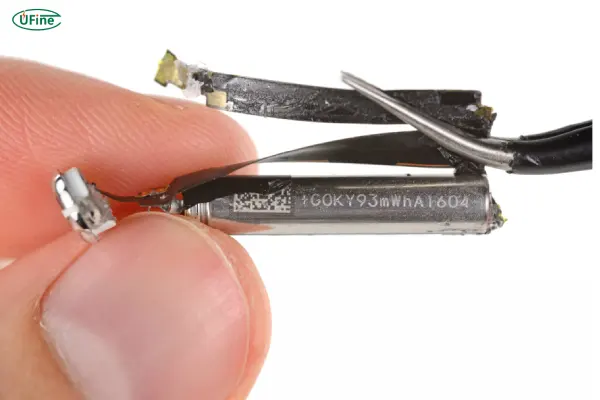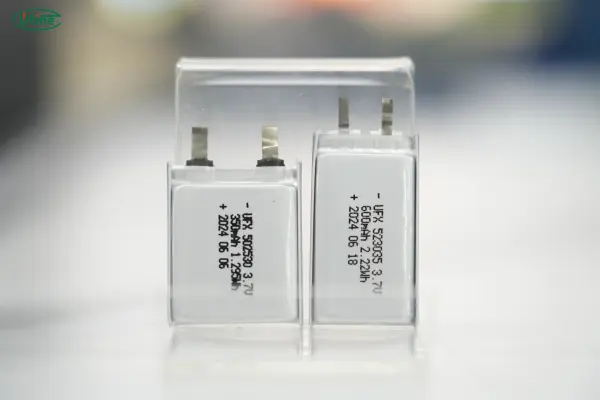
- Part 1. What type of battery does AirPods use?
- Part 2. Why lithium battery?
- Part 3. Does AirPods battery need to be customized?
- Part 4. High-quality AirPods battery: 7 key parameters
- Part 5. How to find a suitable supplier of AirPods battery?
- Part 7. What battery is suitable for AirPods?
- Part 8. Final thoughts
- Part 9. FAQs
Part 1. What type of battery does AirPods use?
Apple’s AirPods have revolutionized the wireless audio experience, and at the heart of their functionality lies the battery technology. Understanding the type of battery used is crucial for both users and manufacturers.
Lithium-Ion Batteries in AirPods
AirPods utilize lithium-ion (Li-ion) batteries, known for their high energy density and lightweight properties. These batteries are rechargeable and provide the necessary power to support features like Bluetooth connectivity, active noise cancellation, and seamless integration with Apple devices.
Battery Specifications Across AirPods Models
| AirPods Model | Battery Type | Listening Time | Talk Time | Charging Case Additional Time |
|---|---|---|---|---|
| AirPods (1st Gen) | Li-ion | Up to 5 hours | Up to 2 hours | Over 24 hours |
| AirPods (2nd Gen) | Li-ion | Up to 5 hours | Up to 3 hours | Over 24 hours |
| AirPods (3rd Gen) | Li-ion | Up to 6 hours | Up to 4 hours | Up to 30 hours |
| AirPods Pro | Li-ion | Up to 4.5 hours (with ANC) | Up to 3.5 hours | Over 24 hours |
| AirPods Max | Li-ion | Up to 20 hours | N/A | N/A |
These specifications highlight the advancements in battery technology across different AirPods generations, emphasizing improvements in battery life and efficiency.
Part 2. Why lithium battery?
The choice of lithium batteries for AirPods is driven by several compelling reasons:
High Energy Density
Lithium batteries offer a high energy-to-weight ratio, providing more power in a compact form, which is ideal for the small size of AirPods.
Lightweight
The lightweight nature of lithium batteries contributes to the overall comfort and portability of AirPods.
Rechargeability
Lithium batteries can be recharged hundreds of times, making them cost-effective and environmentally friendly over the device’s lifespan.
Low Self-Discharge Rate
These batteries have a low self-discharge rate, ensuring that AirPods retain their charge when not in use.
Versatility
Lithium batteries can be manufactured in various shapes and sizes, accommodating the design requirements of AirPods.
These attributes make lithium batteries the preferred choice for powering compact, high-performance devices like AirPods.
Part 3. Does AirPods battery need to be customized?
Absolutely. The compact and ergonomic design of AirPods necessitates customized batteries to fit within the limited space while delivering optimal performance.
Importance of Customization
- Size Constraints: Standard batteries are too large for the sleek design of AirPods. Customized batteries ensure a perfect fit without compromising on capacity.
- Performance Optimization: Tailoring the battery specifications allows for enhanced performance, supporting features like active noise cancellation and seamless connectivity.
- Safety and Reliability: Custom batteries are designed to meet specific safety standards, reducing risks associated with overheating or short-circuiting.
Customization ensures that the battery aligns with the unique requirements of AirPods, balancing size, performance, and safety.
Part 4. High-quality AirPods battery: 7 key parameters
When considering battery replacement or manufacturing, understanding the key parameters that define a high-quality AirPods battery is essential.
1. Capacity (mAh)
Measured in milliampere-hours, capacity determines how long the battery can power the device. Higher capacity translates to longer usage time.
2. Voltage
AirPods batteries typically operate at a nominal voltage of 3.7V. Maintaining the correct voltage is crucial for device functionality and safety.
3. Discharge Rate
This indicates how quickly the battery can release its stored energy. A stable discharge rate ensures consistent performance during usage.
4. Charge Cycles
High-quality batteries support numerous charge cycles (typically 300-500), indicating longevity and cost-effectiveness over time.
5. Operating Temperature Range
Batteries should function efficiently within a range of temperatures, usually between -20°C to 60°C, to accommodate various environmental conditions.
6. Safety Features
Incorporating protection circuits against overcharging, overheating, and short-circuiting is vital for user safety and device integrity.
7. Certification Compliance
Adherence to certifications like UL, CE, and RoHS ensures that the battery meets international safety and environmental standards.
Evaluating these parameters helps in selecting or manufacturing batteries that deliver optimal performance and safety.
Part 5. How to find a suitable supplier of AirPods battery?
Selecting a reliable battery supplier is critical for quality assurance and compliance with industry standards.
Key Considerations
- Experience and Expertise: Choose suppliers with a proven track record in manufacturing customized lithium-ion batteries.
- Quality Assurance: Ensure the supplier adheres to stringent quality control measures and holds relevant certifications.
- Customization Capabilities: The ability to tailor battery specifications to meet specific requirements is essential.
- Technical Support: Responsive customer service and technical assistance are crucial for addressing any issues or queries.
- Competitive Pricing: While cost is a factor, it should not compromise quality and safety standards.
Introducing Ufine Battery
For those seeking a dependable supplier, Ufine Battery stands out as a leading manufacturer of customized lithium batteries. With over 15 years of experience, Ufine specializes in producing various types of lithium polymer batteries, LiFePO4 batteries, 18650 batteries, and more. Their products are known for high energy density, safety, and compliance with international standards.
- Email: sales@ufinebattery.com
Engaging with a reputable supplier like Ufine ensures access to high-quality, customized battery solutions tailored to specific needs.
Part 7. What battery is suitable for AirPods?
Selecting the appropriate battery for AirPods involves considering several factors to ensure compatibility and performance.
Battery Type
AirPods require lithium-ion polymer (LiPo) batteries due to their lightweight and flexible form factors, which align with the compact design of the earbuds.
Capacity and Voltage
A typical AirPods battery has a capacity ranging from 93mWh to 160mWh and operates at a nominal voltage of 3.7V. These specifications support the device’s functionality and usage time.
Size and Shape
The battery must be small and shaped to fit within the limited space of the AirPods housing. Customization is often necessary to achieve the required dimensions.
Safety and Certification
Ensuring the battery includes safety features like overcharge protection and complies with certifications (e.g., UL, CE) is vital for user safety and regulatory compliance.
Collaborating with experienced manufacturers like Ufine Battery can facilitate the development of batteries that meet these specific requirements.
Part 8. Final thoughts
In today’s wireless world, AirPods have become an everyday essential — whether you’re commuting, working out, or taking business calls. Behind this convenience lies a compact powerhouse: the lithium battery. Choosing or replacing an AirPods battery isn’t just about picking a part; it’s about ensuring performance, longevity, safety, and user satisfaction.
Whether you are an individual looking for better battery performance or a business seeking a custom lithium battery solution, remember that quality matters. That’s where a professional, experienced supplier comes in.
Why Partner with Ufine Battery?
As a trusted Chinese lithium battery manufacturer, Ufine Battery provides more than just products — they offer tailored solutions. With years of experience in developing LiPo batteries, LiFePO4 batteries, 18650 batteries, cylindrical, ultra-thin, high-temperature, and high-discharge rate lithium batteries, Ufine is equipped to handle all kinds of custom demands.
Ufine batteries can be made to fit any device’s size, shape, voltage, and capacity — making them ideal for AirPods and similar compact electronics. Ufine also ensures strict quality control, global safety certifications, and responsive customer service.
Need help with a battery solution?
Feel free to reach out!
Email: sales@ufinebattery.com
Part 9. FAQs
Can I replace the battery in my AirPods?
While it’s technically possible, replacing the battery in AirPods is challenging due to their compact and sealed design. It’s recommended to seek professional services or contact Apple for battery replacement options.
How long does an AirPods battery last before needing replacement?
The battery lifespan varies based on usage but typically lasts around 2-3 years. Over time, you may notice reduced listening time, indicating the battery is aging.
Does charging AirPods overnight damage the battery?
AirPods are designed with smart charging features that prevent overcharging. However, consistently charging overnight may contribute to battery wear over extended periods.
How can I extend the battery life of my AirPods?
To prolong battery life, avoid exposing AirPods to extreme temperatures, keep them clean, and store them in their charging case when not in use.
Are there third-party batteries compatible with AirPods?
Yes, there are third-party battery options available, but they must be chosen carefully. Compatibility, safety, and performance should never be compromised. Poor-quality third-party batteries can cause overheating, swelling, or even device damage. It’s essential to buy from reputable sources or manufacturers like Ufine Battery, which specialize in high-quality, customized lithium solutions for consumer electronics.
Related Tags:
More Articles

Capacitor vs Battery: What is the Difference?
Capacitor vs battery explained in detail. Learn the difference between capacitor and battery in energy storage, charging speed, lifespan, and real applications.
18650 Battery vs AA: Which Is Better for Your Device?
Compare 18650 vs AA batteries in capacity, voltage, rechargeability, and applications. Learn which battery type fits high-drain or everyday devices.
What is the Difference Between Battery Cell, Battery Control Module, and Battery Pack?
Compare battery cells, modules, and packs. Learn functions, design differences, control modules, and selection tips for EV, ESS, and industrial use.
How to Prevent LiPo Battery Explosion?
Can LiPo batteries explode or catch fire? Learn key causes of LiPo battery fires and proven charging, storage, and handling tips to reduce explosion risk.
Aluminium Ion Battery vs Lithium-Ion: A Detailed Comparison
Compare aluminium ion battery vs lithium-ion battery in energy density, charging speed, safety, cost, and uses. A practical guide for engineers and buyers.





